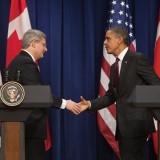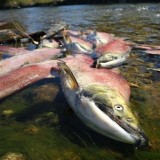The paths, inexorably to a meeting point to violence, can only be changed by the senior governments, especially the feds. The cause of these paths are three: 1. the proposed Enbridge oil pipelines to Kitimat, carrying bitumen (sludge from the Tar Sands) mixed with gas (condensate), with one line running the condensate to the Tar Sands; 2. the Kinder Morgan line bringing the Tar Sands (and if the company has its way, much more of them) to Vancouver Harbour; 3. the tanker companies that would ship this gunk from Kitimat, down through the dangerous Inner Passage to China or the US – and those taking it through the dangerous 2nd Narrows into the Salish Sea, again bound for Asia or America.
Before going further, these projects are not only opposed by First Nations – polls show 80% of British Columbians oppose the tanker traffic and, of course, the pipelines are useless unless the gunk can be shipped.
The matter came to a head when President Obama refused to pass the Keystone XL pipeline from Alberta to Houston. Instantly, federal Finance Minister Jim Flaherty announced that the BC lines must therefore be put on the “fast track”, overlooking, one supposes deliberately, the mandate of the National Energy Board to hold hearings (whose completion time was extended this week by a full year, due in part to the enormous number of citizens and organizations who’ve registered to speak at these hearings). In fact, Flaherty confirmed suspicions that the Federal Government regards this process as a nuisance to be done then ignored.
Over the past few years First Nations have made it clear that this – in former Coastal First Nations’ President Gerald Amos’ words – “is not going to happen”.
Let’s look at the position of First Nations today.
This from an article I did here on December 4. This is saying a hell of a lot but the coverage of the events I’ll deal with were marked by one of the lousiest examples of media mis-reporting I can remember.
…Damien Gillis and I attended a press conference last Thursday called by First Nations who would be impacted by scheduled pipelines and tankers to outline their “Save the Fraser Declaration” – a document that leaves no doubt about their unified opposition to these proposals. In all, 131 nations have now signed on.
Moreover, this declaration almost certainly will be signed in the near future by the Tsleil-Waututh First Nation, who face the proposed expansion of Kinder Morgan’s pipeline from the Alberta Tar Sands to their traditional territory on Burrard Inlet. The Tsleil-Waututh first came out against the company’s plans – which could see up to 300 super tankers loaded with Alberta bitumen plying the waters of Vancouver – in a press release last month…
This hugely important event received a brief column in the Business Section of The Vancouver Sun while the following day’s front page story – with a banner headline – told how Elmer Derrick, one of 60-plus hereditary chiefs of the Gitxsan Nation, had made a deal with Enbridge.
So typical for this sad excuse for a newspaper – bury the big story about an agreement that 131 Chiefs make and pounce with glee on the one who dissents.
Reaction from the Gitxsan was quick with opposition to refuse to recognize the agreement, saying that Derrick was not speaking for them – as this video taken at an emergency community meeting just days after the announcement of the deal demonstrates.
Enbridge fired back that they were comfortable with the deal with Derrick and had many other Nations on side and that they would proceed with signing with them and others.
In jumped Joe Oliver, federal Natural Resources Minister, as reported by the Sun: “[Oliver] said the project, if approved by the National Energy Board, shouldn’t be
held hostage by aboriginal and environmental groups threatening to
create a human ‘wall’ to prevent construction.” The minister continued, “Look, this is a country that lives by the Rule of Law and I would hope that that would be the standard going forward…we can’t let unlawful people oppose lawful development.”
I, apparently, came to Mr. Oliver’s mind – and to remove all doubt, sir, I will indeed be part of that human “wall” and perhaps I should tell you why.
I hardly need any publicity in this my native and much-beloved province. At any age, but especially at 80, I’ve no wish to expose myself to the health hazard posed by prison, but I can’t stand idle while the very essence of this land will be desecrated to satisfy greed without the consent of its people.
Interesting approach. I would have thought he would have said, “When the National Energy Board makes its report and if it supports Enbridge, we hope that the company can get approval from the First Nations involved.”
The scene now shifts back to Mr Derrick. Just yesterday – after going into hiding for five days from the media that had given him so much press – he had an op-ed piece in, where else, The Vancouver Sun, which, apparently, has become a great fan of his. In it Mr. Derrick extols the virtuousness of his involvement with Enbridge and who is in and speaks for the Gitxsan and why. Interesting story but not a single solitary syllable about the environment – nor about the recent controversy of his own making, or even his alleged firing from his job as a treaty negotiator by the community he purportedly represents!
Now I don’t wish to intrude on Gitxsan politics but wouldn’t the rank and file expect their leader, who has made them $7 million for something to be received sometime, would discuss the many questions being raised by 131 of his colleagues and neighbours – men and women of many tribes – all opposed to Enbridge?
Enter the Lawyer. For any decent dispute you need lots of them. Name of Nigel Bankes from the University of Calgary. I can’t tell you what got him cranked up…was it Mr. Derrick? The Conservative government? Enbridge? The Vancouver Sun? Or did he just wake up one morning and decide to unburden himself of his long commitment to the principle that parliaments can do whatever they want?
His contribution consists in telling us that Enbridge does not need to get permission for its pipelines from “every first nation over (the pipelines) it passes…at the end of the day there isn’t a first nations veto.”
He does concede, according to the Sun, that “governments do have an obligation to consult with nations…and must demonstrate they have ‘integrated the result of consultations in the project’s design.’”
The government, Enbridge and Mr. Derrick seem to be saying that the rank and file First Nations, through their leaders, do not have the right to use the international words for GO AWAY to Enbridge, because in the government reposes the law of the land, which, after a little pas de deux to entertain the masses, it can do as it pleases!
I hate to disappoint Messrs Derrick, Oliver, Bankes (sounds like a good name for a law firm) but many First Nations and their lawyers hold a contrary view and say that section 35 does in fact give them a veto.
Section 35 of the Constitution Act of 1982 provides constitutional protection to the aboriginal and treaty rights of aboriginal peoples in Canada. The rights Section 35 has been found to protect are fishing, logging, hunting, the right to aboriginal title and the right to enforcement of treaties. There remains a debate over whether the right to aboriginal self-government is included within section 35. Since 1995 the Government of Canada has had a policy recognizing the inherent right of self-government under section 35.
The leaders in the aboriginal community that I have spoken to make it clear that if rights in Section 35 grant them powers as indicated, clearly they must have full rights to protect them. They go further and say that their law prevails on all matters save where their title and rights might have been ceded – and they haven’t been, where the proposed Enbridge pipeline and tanker routes are concerned.
My question as a lawyer of long ago – if the government and Enbridge say they have the right to do as they please, why not just do it? If Mr. Bankes is right that there is no right of First Nations to stop them, why doesn’t Enbridge hold some hearings with the First Nations, say that they have consulted, then get on with it?
This isn’t a smart alec question at all, for if all Enbridge need do in Bankes’ opinion is integrate the results of consultation in the project’s design, a first year law student would be all that’s needed to gussy their design up to suit.
I close with a serious warning to the government and Enbridge: You are proceeding down a one-way path to disaster. Enbridge doesn’t care for the environment – look at their record. Look at what they did in 2010 in the Kalamazoo River! Oil spills are simply a cost of business which is, happily, a tax credit.
Aboriginal peoples say that they stand upon the Rule of Law, which they say includes their own law as guaranteed under Section 35 of the Constitution Act. They make the sensible argument that to have rights over fishing, logging, hunting, the right to aboriginal title and the right to enforce treaties, those words must mean that they can legislate to protect them – otherwise the words mean nothing.
Mr. Oliver – you’re being a damned fool and a dangerous one and when the violence comes, as it will, it will be on your head and that of your government. I’m not inciting violence – on the contrary, it is because I so abhor violence I plead with your government to come to its senses.
Don’t say you weren’t warned!







